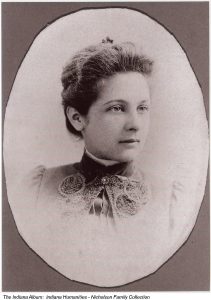
Photo info ...
Credit: The Indiana Album: Indiana Humanities-Nicholson Family CollectionView Source
(July 11, 1867- Dec. 20, 1931). Born Eugenie Clementine Kountze in Omaha, Nebraska to Herman and Elizabeth Davis Kountze, Eugenie Kountze briefly moved to Indianapolis as a teenager to live with her grandparents and attend the Kappes School. After graduating from Kappes School, she attended Vassar College, where she earned her A.B. in 1888.
Kountze returned to Indianapolis after graduation, where she met newspaperman and author . The two married on June 16, 1896, a union that produced four children: Elizabeth, Eugenie, Meredith, and Lionel. After a brief time living in Denver, Colorado, the couple settled in Indianapolis in 1901, the current location of .
Though deeply involved in politics while at Vassar, writing analyses, reviews, and opinion pieces for the college newspaper, the Vassar Miscellany, Eugenie Kountze Nicholson became increasingly involved in the in the 1910s. She served as vice president of the Woman’s Franchise League of Indiana from 1912 to 1915—a period that coincided with the revitalization of the suffrage movement in Indiana under the leadership of suffragists like . In 1911, Eugenie and Meredith Nicholson each testified before the state legislature on behalf of a women’s suffrage bill up for ratification. In his testimony, Meredith Nicholson questioned “why woman [sic] should be educated up to the point where she asks questions and then is told that she was educated merely out of compliment to the public schools and that the men, in their superior wisdom, shall take care of things.” In an article from the same time, Eugenie Kountze Nicholson wrote,
“Women are citizens and they should be granted a citizen’s privileges. They should not be compelled to fight for suffrage. It is their simple right and should be extended without question since a woman is as much a citizen as a man.”
In addition to her political involvement, Eugenie Kountze Nicholson enjoyed social and philanthropic endeavors. She belonged to various civic groups, such as the , the , the Progressive Club, the Indianapolis Public Health Association, and the . When the United States entered World War I in 1917, Eugenie Kountze Nicholson shifted her focus from politics to war work. She headed the Red Cross’s Surgical Dressing Division from March to July 1917. Additionally, she led the canteen service at Indianapolis’s between March 1918 and the summer of 1919.
Eugenie Kountze Nicholson retired from her political, social, and civic work due to her ill health, a result of her fervent war work. She is buried in with her husband, Meredith Nicholson.

Help improve this entry
Contribute information, offer corrections, suggest images.
You can also recommend new entries related to this topic.